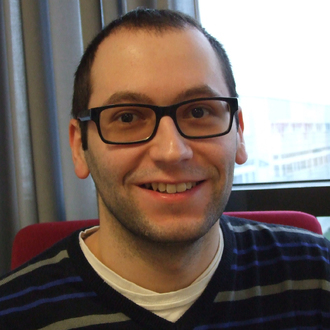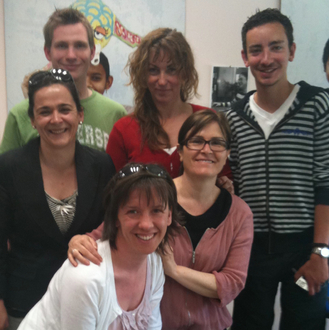
Spain
Florence in the Canary Islands

Florence who is student in L3 STAPS (Sciences and Techniques of physical activities and sports) performs her ERASMUS at the University of Las Palmas de Gran Canaria in the Canary Islands. She testifies:
"The University is at Tafira. If you live in Las Palmas as 90% people there, the best solution for transportation is to take the bus. It is accessible by wheelchair. It is also possible to take a taxi which is really cheap and some are suitable for wheelchair users. I haven’t managed to have contact with a disability service, but the University is relatively small, and it is quickly known. It is easy to go to the schooling department and talk about it. For accommodation, the best is to look in the private sector; University residences are very expensive there!
Life on the island is really nice. The weather is ideal with an average of 25 degrees all over the year and people are very hospitable. But the true highlight of Spain is for allergic or intolerant people, especially for the celiac disease (gluten). It is a more wide-spread disease over there and thus known by everybody. Many measures are organized. For example, at McDonald you can find hamburgers without gluten. You can find also restaurants for coeliac situated at the edge of the ocean which allows eating peace of mind with a magnificent view!
For the accessibility, to go for a stroll on the seaside is possible in wheelchair and the city center is accessible generally too. Small importantly, French medical prescriptions are valid in Spain except as regards medicine for the brain (for example against the epilepsy). It is thus necessary to go to the hospital’s emergencies to get a valid prescription.
It is an island which I deeply advise you for the comfort of life, a pleasant weather report all year long and for a very alive city! "
Go in Spain with Guillaume!

Guillaume, Student in double program at the University of Rouen in 2nd year of License (bachelor) of law and 2nd year of bachelor of sociology, decided to study sociology in Madrid through the ERASMUS exchange program at the Universidad Complutense of Madrid in the second half-year.
Find his adventures on his blog:
http://hola-madrid.blogspot.com.es/
From 26 to 29th April, 2011

3 disabled students went on stay in Madrid to meet with 3 Disability Departments of Spanish universities: the Universidad Carlos III (Getafe Campus C/Madrid), the Universidad Complutense and Autónoma University.
Each University is obliged to create a Service to welcome students with disabilities in Spain as in France. An Accessibility law also establishes obligations to standard. The difficulties and the solutions found are close to those met in France in higher education (examination arrangements, note-takers, and transportation help).
- Employment
Regarding employment, there is an employment duty of people with disabilities of 5% in public administration and 3% in companies over 50 employees, but without check until these recent years. The financial constraints aren’t enough dissuasive.
- Accessibility to the visually impaired very to the point!
Regarding accessibility, Madrid and 3 universities have done a real work of compliance. The subway and the bus from Madrid are accessible. OUNCE (a charity whose resources come from a raffle) helps to improve the accessibility of the blind and the partially-sighted people.
Braille, lighting, contrasted pavements, nameplates adapted: an example to follow!
- There’s no association HANDISUP abroad
As already found in England, in Ireland and in Belgium, in Spain there is no HANDISUP type association. The students with disabilities remain alone in their studies choices and jobs choices. They have to discover the company without any suitable accompaniment.
- Partnerships
The Disability Services of universities we met want to work with HANDISUP to facilitate the Spanish and French students’ mobility.
Je veux étudier comment faire ? J'envisage un métier, à qui en parler? Je dois faire un stage, où chercher ?









































